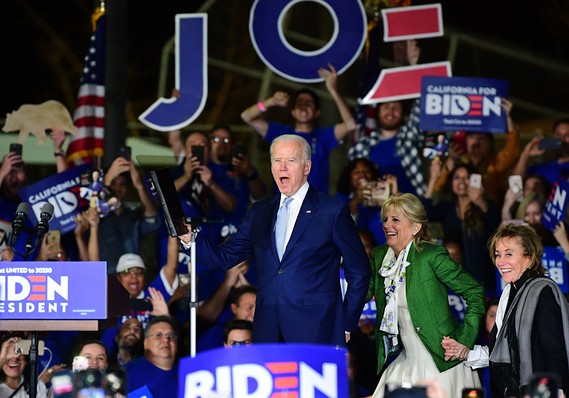 AFP/Getty Images
AFP/Getty Images Joe Biden scored a string of victories across the country in Super Tuesday Democratic primaries, battling for delegates with Bernie Sanders as his chief rival won California.
Voters in 14 states cast ballots on the biggest day of the nominating calendar to date, and returns continued to roll in past 11 p.m. Eastern. Biden won Alabama, Arkansas, Massachusetts, Minnesota, North Carolina, Oklahoma, Tennessee and Virginia, according to projections.
“They don’t call it Super Tuesday for nothing,” Biden said in a speech in Los Angeles.
Sanders was projected to win the night’s biggest prize, California, suggesting a long slog for the nomination. The Vermont senator also won his home state, as well as Colorado and Utah. Polls closed at 9 p.m. Eastern in Texas but results were too close to call in that delegate-rich state.
Tuesday’s contests come as moderate Democrats were rallying around former Vice President Biden following his decisive win in Saturday’s South Carolina primary. Billionaire former New York Mayor Mike Bloomberg was on the ballot for the first time Tuesday, having skipped early contests. Massachusetts Sen. Elizabeth Warren lost her home state to Biden in a call that came about three hours after the state’s polls closed.
Read: How Mike Bloomberg is dominating in Super Tuesday advertising — in one chart.
Polls closed after stocks DJIA, -2.94% see-sawed in a wild trading session following a surprise half-point interest-rate cut by the Federal Reserve that was aimed at cushioning the economy from fallout related to the spread of the coronavirus. U.S. stock futures YM00, +1.49% surged late Monday night as Biden notched wins.
Super Tuesday’s contests offer about one-third of the pledged delegates to the July Democratic National Convention: 1,357 of 3,979. To capture the nomination on the first ballot, a candidate will need a majority of pledged delegates — at least 1,991. A Wall Street Journal tracker showed Biden ahead Tuesday night with 368 delegates, and Sanders with 286.
California offers the biggest delegate haul of the night, with 415. Texas has the second-most at stake, with 228. Democrats’ delegates are awarded proportionally based on performance in each state.
A protracted battle for delegates would heighten the chances of a contested convention, in which no candidate will win the required number of delegates on the first ballot at this summer’s convention in Milwaukee. The last time the Democrats’ convention went beyond the first ballot was 1952.
Now see: How Democrats could end up deadlocked on a presidential nominee for the first time in 68 years.
The Super Tuesday states are Alabama, Arkansas, California, Colorado, Maine, Massachusetts, Minnesota, North Carolina, Oklahoma, Tennessee, Texas, Utah, Virginia and Vermont. Residents of U.S. territory American Samoa and Democrats abroad also cast their ballots.
Before polls closed, President Donald Trump again suggested that the “Democratic establishment” is trying to undermine Sanders’ chance of winning the nomination but said Biden was “looking better.”
“Whoever it is, I don’t care,” Trump told reporters. “Whoever it is, we will take them on. The job we’ve done, we’ve rebuilt the military, we have the strongest economy we’ve ever had, all of the things we’ve done, I will take on anybody,” he said.
Biden’s victory in Saturday’s South Carolina primary buoyed the former vice president, who is offering a moderate alternative to self-described democratic socialist Sanders. Where Sanders proposes Medicare for All and eliminating private health-insurance plans, for example, Biden pledges to build on the Affordable Care Act, or Obamacare.
Exit polls suggested Biden’s victories in the South were strongly driven by African-American voters.
Sanders has for years sought to transform American politics and the U.S. economic system, and his agenda includes canceling student debt, banning fracking and reducing income inequality.
Projecting confidence late Tuesday, the senator told a crowd of backers in Vermont, “I can tell you with absolute confidence we’re going to win the Democratic nomination.” He pledged to defeat “the most dangerous president in the history of this country.”
Bloomberg dominated his rivals in spending on Super Tuesday advertising, and his advantage with ads mirrors his overall big edge with money in the Democratic race. His self-funded campaign reported spending more than $400 million so far in the contest in the most recent round of financial disclosures, well ahead of the Sanders campaign’s outlay of about $123 million and Biden’s spending of just $63 million.
Bloomberg had a disappointing evening. His sole victory was in American Samoa. Hawaii Rep. Tulsi Gabbard, also running for the Democratic nomination, reportedly won one of the territory’s delegates.
The New York billionaire showed no sign of giving up his bid, telling supporters “together, we’re going to get it done.” Speaking in West Palm Beach, Fla., Bloomberg said he had the resources to beat Trump in Florida and other key states. The Associated Press, meanwhile, reported he plans to reassess his campaign on Wednesday.
See: Mike Bloomberg to reassess campaign after disappointing results.
On Monday, former Democratic presidential candidates Amy Klobuchar and Pete Buttigieg united behind Biden’s presidential bid, as the Democratic Party’s moderate wing scrambled to boost him just hours before voting began in Super Tuesday states.
As the Associated Press wrote, it reflected deep concerns from the Democratic establishment that Sanders was positioned to seize a significant delegate lead from Tuesday’s contests.
Read: Buttigieg, Klobuchar throw support to Biden on eve of Super Tuesday.
Victor Reklaitis contributed to this report.
div > iframe { width: 100% !important; min-width: 300px; max-width: 800px; } ]]>








